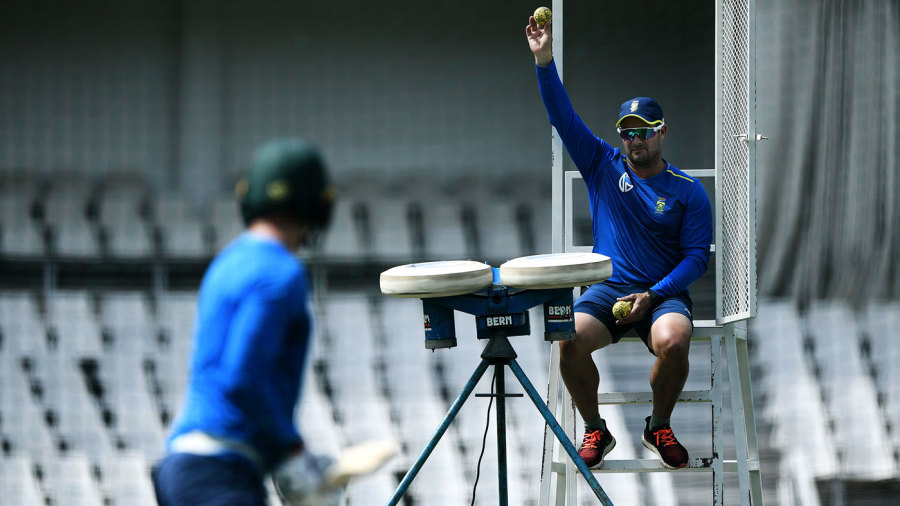
South Africa are set to make what coach Mark Boucher called “brave calls,” in deviating from their usual seamer-focused approach to a more spinner-based set-up for the subcontinent. On surfaces Boucher thinks are being prepared for turn, he confirmed that South Africa will “definitely play more than one spinner,” in the Karachi Test.
“We always revert back to our seaming options because that’s what we get grown up to think,” Boucher said. “But if it looks like it’s going to turn, we must make the right selections and make good cricket calls. I encourage an open mindset rather than going back to the norm. It’s a two-match series, so we can’t go one down and have regrets that we should have played an extra spinner. We’ve got to make the call right now. We’re coming with a mindset that if we want to win a series away from home, we’ve got to make a couple of brave calls.”
South Africa have taken three spinners and nine seamers to Pakistan. Kagiso Rabada, who missed the home Tests against Sri Lanka with a groin injury, is set to return, even though Boucher does not think reverse swing will play a big role in this series.
“We spoke about reverse swing but having gone to the ground only recently, we found the outfield was very green and quite moist. I don’t know how big a weapon reverse swing is going to be,” Boucher said. “The conditions are going to be proper subcontinent conditions and I don’t think there will be a lot of assistance for seamers.”
That will mean South Africa will have to decide if they think Anrich Nortje’s pace will be more effective than Lutho Sipamla’s consistency or Lungi Ngidi’s aggression, considering there may only be space for one of the three if Rabada, an allrounder (Wiaan Mulder) and two spinners play. They also have to choose which of the spinners to select and early indications are that the job will be given to Keshav Maharaj, the incumbent, and Tabraiz Shamsi, the wristspinner who has not played a Test since 2018. “Tabraiz has been selected as an attacking, aggressive spinner. If you get given the opportunity to give him a chance in spinning conditions, then why not?” Boucher asked.
Boucher also expects Maharaj to come into his own in this series, after operating in the shadows of the quicks in the home Tests. “Kesh is hungry, He didn’t bowl a lot against Sri Lanka, for various reasons like the wicket was more conducive to seam bowling. He is hungry to get stuck in and play a role.
“Being our main spin bowler over the last few years, with all respect to him, he didn’t have the best tour of India. We’ve worked on a couple of technical things and he has come on in leaps and bounds. He is itching to get out there, especially in these conditions where he knows he is going to be bowling a lot and potentially could have a series where he could have a massive impact on a win.”
Maharaj played in two of South Africa’s three Tests on their 2019 tour to India (he was injured for the last match) and bowled 127 overs, with returns of 6 for 514. Compare that with the haul of R Ashwin (15 wickets) and Ravindra Jadeja (13) and that Rabada was South Africa’s leading bowler with seven wickets, and it’s understandable why Maharaj did not have a great outing. He has had more success in Sri Lanka, where in 2018, he was the joint leading-wicket taker with 16 wickets across the two Tests, both of which South Africa lost.

For Maharaj, the next frontier is to lead the attack and the team to victory in conditions suited to spin but that’s not the only individual goal South Africa have set. “We are putting a challenge on how many hundreds we want to score,” Boucher said.
South Africa recorded their first opening century stand in three years against Sri Lanka over the festive season but only two batsmen scored hundreds: Dean Elgar and Faf du Plessis. That puts the spotlight on Aiden Markram, who struggled against spin in Sri Lanka and India, Rassie van der Dussen, who has gone 43 international innings without a hundred, and Temba Bavuma, whose only Test century came five years ago.
“A big innings first score will always be a bonus, because once you get that you get in control of the game,” Boucher said. “The wickets are generally pretty good for the first two or three days and then once you start getting a bit of rough, the ball starts turning. The game tends to speed up towards the end of the game so first innings runs are important.”
With all the talk of turn, and last week’s remark by captain Quinton de Kock, that subcontinent teams prepare dustbowls to “target” South Africa, you may expect the general mood is that South Africa are being disadvantaged but Boucher refused to see it that way.
“It’s not doctoring, it’s being smart about where you play your opposition and how you can drive home an advantage where you maybe see a weakness in your opposition.”
To that end, South Africa have identified how they can look to exploit some of Pakistan’s vulnerabilities. Boucher suggested South Africa have to wrest control early, against a young and rebuilding Pakistan side. “If we can get them doubting themselves early on in the Test match, we must do that. It can play to our advantage. If we can get momentum going our way early on, it will be a big advantage for us.”
Firdose Moonda is ESPNcricinfo’s South Africa correspondent
©
ESPN Sports Media Ltd.
